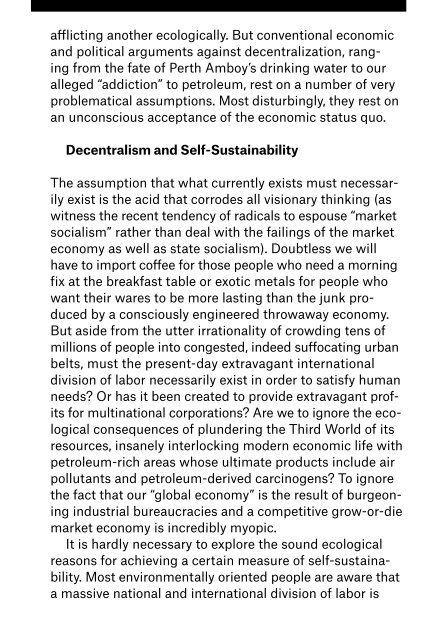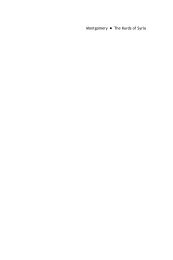Stateless Democracy
1RHiH4Y
1RHiH4Y
Create successful ePaper yourself
Turn your PDF publications into a flip-book with our unique Google optimized e-Paper software.
afflicting another ecologically. But conventional economic<br />
and political arguments against decentralization, ranging<br />
from the fate of Perth Amboy’s drinking water to our<br />
alleged “addiction” to petroleum, rest on a number of very<br />
problematical assumptions. Most disturbingly, they rest on<br />
an unconscious acceptance of the economic status quo.<br />
Decentralism and Self-Sustainability<br />
The assumption that what currently exists must necessarily<br />
exist is the acid that corrodes all visionary thinking (as<br />
witness the recent tendency of radicals to espouse “market<br />
socialism” rather than deal with the failings of the market<br />
economy as well as state socialism). Doubtless we will<br />
have to import coffee for those people who need a morning<br />
fix at the breakfast table or exotic metals for people who<br />
want their wares to be more lasting than the junk produced<br />
by a consciously engineered throwaway economy.<br />
But aside from the utter irrationality of crowding tens of<br />
millions of people into congested, indeed suffocating urban<br />
belts, must the present-day extravagant international<br />
division of labor necessarily exist in order to satisfy human<br />
needs? Or has it been created to provide extravagant profits<br />
for multinational corporations? Are we to ignore the ecological<br />
consequences of plundering the Third World of its<br />
resources, insanely interlocking modern economic life with<br />
petroleum-rich areas whose ultimate products include air<br />
pollutants and petroleum-derived carcinogens? To ignore<br />
the fact that our “global economy” is the result of burgeoning<br />
industrial bureaucracies and a competitive grow-or-die<br />
market economy is incredibly myopic.<br />
It is hardly necessary to explore the sound ecological<br />
reasons for achieving a certain measure of self-sustainability.<br />
Most environmentally oriented people are aware that<br />
a massive national and international division of labor is<br />
extremly wasteful in the literal sense of that term. Not only<br />
does an excessive division of labor make for overorganization<br />
in the form of huge bureaucracies and tremendous<br />
expenditures of resources in transporting materials over<br />
great distances; it reduces the possibilities of effectively recycling<br />
wastes, avoiding pollution that may have its source<br />
in highly concentrated industrial and population centers,<br />
and making sound use of local or regional raw materials.<br />
On the other hand, we cannot ignore the fact that relatively<br />
self-sustaining communities in which crafts, agriculture,<br />
and industries serve definable networks of confederally<br />
organized communities enrich the opportunities<br />
and stimuli to which individuals are exposed and make for<br />
more rounded personalities with a rich sense of selfhood<br />
and competence. The Greek ideal of the rounded citizen in<br />
a rounded environment — one that reappeared in Charles<br />
Fourier’s utopian works — was long cherished by the anarchists<br />
and socialists of the last century.<br />
The opportunity of the individual to devote his or her<br />
productive activity to many different tasks over an attenuated<br />
work week (or in Fourier’s ideal society, over a given<br />
day) was seen as a vital factor in overcoming the division<br />
between manual and intellectual activity, in transcending<br />
status differences that this major division of work created,<br />
and in enhancing the wealth of experiences that came with<br />
a free movement from industry through crafts to food cultivation.<br />
Hence self-sustainability made for a richer self, one<br />
strengthened by variegated experiences, competencies,<br />
and assurances. Alas, this vision has been lost by leftists<br />
and many environmentalists today, with their shift toward<br />
a pragmatic liberalism and the radical movement’s tragic<br />
ignorance of its own visionary past.<br />
We should not, I believe, lose sight of what it means to<br />
live an ecological way of life, not merely follow sound ecological<br />
practices. The multitude of handbooks that teach<br />
114–115



